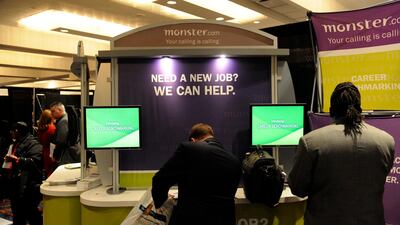The US added fewer jobs than expected in December amid a decline in retail employment, but a pick-up in monthly wage gains pointed to labour market strength that could pave the way for the Federal Reserve to increase interest rates in March.
Nonfarm payrolls increased by 148,000 jobs last month after surging by 252,000 in November, the Labour Department said on Friday. Retail payrolls decreased by 20,300 in December, the largest drop since March, despite reports of a strong holiday shopping season.
The unemployment rate was unchanged at a 17-year low of 4.1 percent. Economists polled by Reuters had forecast payrolls rising by 190,000 in December. The economy needs to create 75,000 to 100,000 jobs per month to keep up with growth in the working-age population.
"We do not think that today's employment report will keep the Federal Reserve from tightening again at the March policy meeting, given other strong recent economic data," said David Berson, chief economist at Nationwide in Columbus, Ohio.
Job growth surged in October and November after being held back in September by back-to-back hurricanes, which destroyed infrastructure and homes and temporarily dislocated some workers in Texas and Florida.
Taking some sting out of the moderation in job gains, average hourly earnings rose 9 cents, or 0.3 percent, in December after gaining 0.1 percent in the prior month. That lifted the annual increase in wages to 2.5 percent from 2.4 percent in November.
_______________
Read more:
Solid U.S. job growth expected in December; wages seen rising
Asian shares near record high, dollar weak as job, wage data awaited
_______________
US short-term interest rate futures and prices of U.S. Treasuries rose after the data while the dollar pared gains against the yen and fell against the euro. US stock index futures briefly pared gains.
Employment gains in December were below the monthly average of 204,000 over the past three months. Job growth is slowing as the labour market nears full employment, but could get a temporary boost from a $1.5 trillion package of tax cuts passed by the Republican-controlled U.S. Congress and signed into law by President Donald Trump last month.
The lift from the fiscal stimulus, which includes a sharp reduction in the corporate income tax rate to 21 percent from 35 percent, is likely to be modest as the stimulus is occurring with the economy operating almost at capacity. There are also concerns the economy could overheat.
"With the tax cuts we get solid GDP growth in the near-term and then a fiscal hangover, which will likely put the economy at a greater risk of recession," said Ryan Sweet, senior economist at Moody's Analytics in West Chester, Pennsylvania.
For all of 2017, the economy created 2.1 million jobs, below the 2.2 million added in 2016. Economists expect job growth to slow further this year as the labour market hits full employment, which will likely boost wage growth as employers compete for workers.
Economists are optimistic that annual wage growth will top 3.0 percent by the end of this year. The December employment report incorporated annual revisions to the seasonally adjusted household survey data going back five years.
There was no change in the unemployment rate, which declined by seven-tenths of a percentage point last year.
Economists believe the jobless rate could drop to 3.5 percent by the end of this year. That could potentially unleash a faster pace of wage growth and translate into a much stronger increase in inflation than currently anticipated.
That, according to economists, would force the Fed to push through four interest rate increases this year instead of the three it has pencilled in. The US central bank raised borrowing costs three times in 2017.
"If the unemployment rate declines and wages rise faster, which is likely, the Fed is going to start worrying about wage inflation," said Joel Naroff, chief economist at Naroff Economic Advisors in Holland, Pennsylvania.

